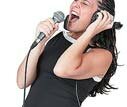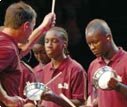Buying an instrument do’s and don’ts
We’ve put together some notes to assist parents in purchasing or renting instruments for their children. We hope you find them useful. Of course, if you need more detailed guidance, your local music service will be happy to help you.
Before you buy checklist
Before you start on the process of buying an instrument there are a few things you should think about.
- Is renting or buying best for me and my child?
- Would buying new or second hand be the right choice?
- What would an appropriate budget be?
- Have I researched my options fully?
Research
There are plenty of avenues of research you can make use of to ensure that you have all the facts you need before committing to buy.
- Have friends recently brought an instrument for their child? If so, it’s worth asking them to share the benefit of their experience before you start out
- Look at online shops so that you can compare prices and read reviews. You’ll start to build up an idea of the sort of money that you’ll need to spend for an appropriate quality instrument
- Local libraries should stock music magazines, which will include reviews and a classified section with a selection of instruments for sale
- You should be able to locate your local instrument shops by looking through the Yellow Pages. A visit to the shops will help you to get a feel for the range of prices. Many larger musical instrument shops have a practice room where you can try out an instrument. It’s important to handle some instruments and listen to them so that you can get a feel for them before buying.
- Your local Music Service will be able to provide expert advice about where to start looking, an appropriate quality of instrument and an appropriate budget.
Rent or buy? New or second hand?
If your child has only just started to learn, or you are unsure of their commitment, it may be better to rent before you commit to buying. If you have a limited budget, it could be that purchasing a second hand instrument from a reputable source is best for you.
- Many Music Services offer an instrument rental scheme. Talking to them is a good place to start.
- Some shops also rent out instruments. Your Music Service should be able to help you with a list of shops that offer this service. Some shops offer a ‘hire and try’ scheme, often with the option of buying.
If you choose to buy a second hand instrument, it’s worth looking in the small ads of local papers or music magazines. Many instrument shops also stock second hand instruments.
- Make sure the seller gives you all relevant paperwork for the instrument
- Have expensive instruments checked by a specialist first
- Ask about how much maintenance it has had. For a larger instrument, such as a piano, check whether it has been overhauled in the past ten years.
- Check for damage - knocks or dents can affect the resale value
- Some instruments are better to buy second hand than others. For instance a second hand brass or woodwind instrument may need repairs that even an expert may not notice. A reliable ’student’ model may be a better option for a limited budget.
- With string instruments your child can start off renting a quarter or half size model, until they are old enough to play a full sized instrument.
- Second hand electric guitars can be a good option to start with. Starter models can be good value too.
- Remember that you will need a suitable practice amplifier.
- Pianos can be expensive to buy new. A decent second hand piano can cost much less, but make sure that you seek specialist advice before you buy. Most piano tuners will agree to look at a piano and give you an opinion.
Budget
When determining a suitable budget, you’ll need to weigh up the amount of money you have available to spend with a budget that suits your child’s needs.
- How long has your child been learning and how committed are they to learning long term? Buying your child a “student model” or beginner’s instrument can be a good option. The sound quality is less than professional models but good enough for a child to get the basics.
- Remember to go for the very best you can afford - if you are aiming to interest your child in the sound of the instrument, then it must be a good sound!
- There is a wide difference between the cheapest instruments and the most expensive. A beginner would probably be better starting off at the lower end of the market and then progress higher as their skills improve. A professional musician would be looking at the higher end of the market to obtain the quality of sound that they desire.
VAT relief scheme
The Assisted Instrument Purchase Scheme (AIPS) enables pupils, who are receiving music tuition at a Local Education Authority (LEA) school to purchase musical instruments without paying the VAT, saving a significant amount of the cost.
More details of this scheme can be found in our notes on the VAT Relief Scheme, or through your local Music Service


